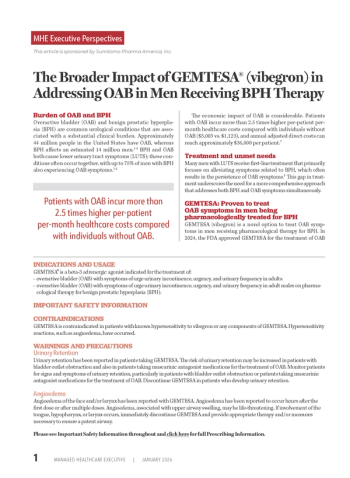
- MHE February 2022
- Volume 32
- Issue 2
Patients Benefit with Coordinated Care Among PBM and Provider
Two-thirds (66%) of American adults take a prescription medication.1 And approximately 4% of Americans take a specialty medicine.2 The average annual cost for one specialty medication used on a chronic basis was $84,442.3 Imagine a patient paying that much to manage their health for one single medication. Now imagine them unknowingly paying even more than is necessary because of non-optimized dosing, duplicative therapy or not utilizing a lower cost alternative.
As a practicing physician at Minnesota Oncology and chief medical officer at pharmacy benefit manager (PBM) Prime Therapeutics, I see endless possibilities for the provider and PBM segments of the health insurance industry to work better together for the benefit of our mutual members and patients. Prime is owned by and services many Blue Cross and Blue Shield health plans around the country. We have the benefit of access to completely integrated data – the pharmacy claims data and the medical claims data of our health plan clients. This allows for a more complete look at member behavior and affords us opportunities for optimizing medication therapy.
HighTouchRx™ is one approach to help ensure patients are viewed holistically by their PBM/insurer and their provider. HighTouchRx starts with the integrated pharmacy and medical claims data being fed into a clinical rules engine, that utilizes machine learning, created by and continuously quality improved by a Prime Therapeutics dedicated team of pharmacists and data scientists. This rules engine analyzes these claims and reports on opportunities for intervention based on impact of potential savings. Prime’s dedicated rules committee meets regularly to identify gaps in existing rules engine outputs, improve the quality of the engine output, identify medications to add or remove from the engine, and generate ideas for new rule categories.
One example is when a member is taking a large number of a low-dose tab medication. Consolidating those tabs to fewer, higher-dose tabs may result in tens-of-thousands of dollars of savings. The member’s pill burden was reduced, resulting in better care at a lower cost. A savings that large rises to the top of the rules engine report. Our rules engine ranks savings opportunities using several factors including savings potential, potential successful drug therapy optimization and member recent health care utilization patterns.
But how does this happen? Specially trained pharmacists empowered with data. High-touch pharmacists use Prime’s rules engine knowledge to conduct personalized outreach to providers. Health plans have the option to have Prime-embedded pharmacists take on this work or equip their own in-house pharmacists to execute the outreach. Truly coordinated care with the member at the center.
And machine learning only gets better with larger volumes of data over time. As this program continues and grows, Prime’s analytics engine will intuitively learn how to better prioritize higher impact interventions. This makes changes more significant for the member. And the provider can know they, too, are making positive changes for their patients.
The introduction of HighTouchRx comes after several successful pilots. One Prime study showed savings of a net $2.4 million in healthcare costs in one year. A second study analyzed the success of drug therapy programs where managed care pharmacists recommended drug therapy optimization with members and providers. It delivered $7.8 million in net cost avoidance. These pilots have already received The Pharmacy Benefit Management Institute (PBMI) 2021 Excellence Award in the category of cost containment.
When 16% of the total cost of care is driven by non-optimized medication, opportunity is ripe to work differently.4 With HighTouchRx, Prime is continuing to maximize the data we have and giving providers new insights while continuing to keep the member at the center of decision-making.
For more information on Prime Therapeutics’ HighTouchRx program visit
Joseph Leach, M.D., senior vice president, chief medical officer at Prime Therapeutics and practicing oncologist, is responsible for providing clinical leadership and expertise, informing and influencing internal and external stakeholders about Prime’s specialty and total drug management capabilities, contributing to innovation in these capabilities and driving client growth.
https://hpi.georgetown.edu/rxdrugs/
https://www.psgconsults.com/specialtyreport
https://press.aarp.org/2021-9-28-Average-Specialty-Drug-Price-Reached-84,442-2020-Rising-Three-Times-Faster-Prices-Other-Goods-Services
https://health.ucsd.edu/news/releases/Pages/2018-04-02-when-drugs-are-wrong-skipped-or-make-you-sick-the-cost-of-non-optimized-medications.aspx
Articles in this issue
almost 4 years ago
Large Employers Launch PBMalmost 4 years ago
‘Hybrid Health’ Opens up Opportunities and Exposes Gaps in Healthcarealmost 4 years ago
Medicare’s Independence at Home Program Posts Disappointing Resultsalmost 4 years ago
Johns Hopkins Program Saves Moneyalmost 4 years ago
There’s no Place like Home. That is also true for Healthcare.almost 4 years ago
Solving the Puzzle of Cancer and COVID-19 Vaccinationalmost 4 years ago
No Giving It Short Shrift: COVID-19 Can Be a Long Haulalmost 4 years ago
Is Healthcare Ready For Blockchain?about 4 years ago
SPACs in Healthcare: The Hot Ticket has Cooled offNewsletter
Get the latest industry news, event updates, and more from Managed healthcare Executive.



















